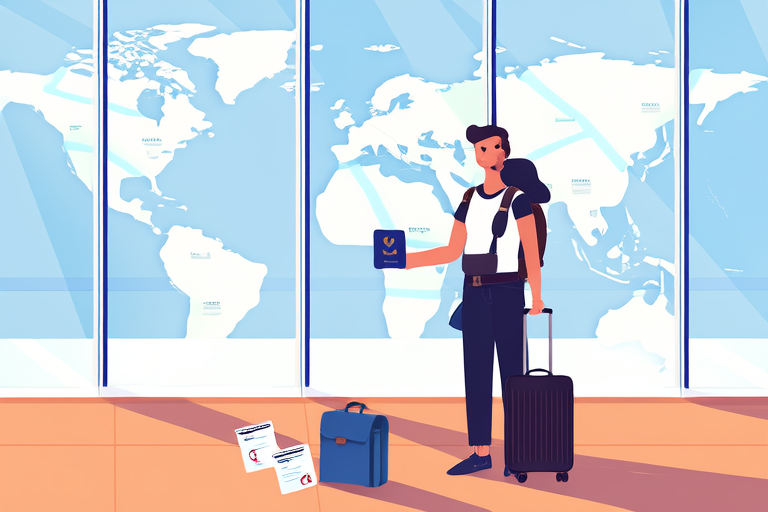The Ultimate Guide to International Travel: Passport, Visa, and Health Preparations
Introduction
Traveling internationally is an exciting adventure that can broaden your horizons and create unforgettable memories. However, the process of preparing for international travel can be daunting, especially when it comes to ensuring you have all the necessary documents and health precautions in place. This guide will walk you through everything you need to know about passports, visas, and health preparations to ensure a smooth and hassle-free trip.
Understanding Passports
What is a Passport?
A passport is an official document issued by a government that certifies the identity and nationality of its holder for the purpose of international travel. It serves as proof of citizenship and allows you to enter and exit countries. Without a valid passport, you won’t be able to board your flight or cross borders.
How to Apply for a Passport
Applying for a passport can vary depending on your country of residence. In the United States, for example, you can apply for a passport at your local post office, regional passport agency, or online through the U.S. Department of State’s website. Make sure to gather all required documents such as a birth certificate, proof of citizenship, and two passport photos. The application process typically takes several weeks, so it’s important to start early.
Renewal and Expiration
Passports usually have a validity period, often ranging from 5 to 10 years, depending on the issuing country. It’s crucial to check the expiration date before planning your trip. If your passport expires within six months of your intended travel date, many countries may deny you entry. Additionally, if you lose your passport while traveling, you should contact your embassy or consulate immediately to obtain a replacement.
Navigating Visas
What is a Visa?
A visa is a conditional authorization granted by a country that allows a non-resident to enter, stay in, and (sometimes) leave that country. Not all countries require a visa for short-term visits, but it’s essential to check the visa requirements for your destination. Some countries offer visa-free entry for certain nationalities, while others may require you to apply for a visa in advance.
Types of Visas
There are various types of visas, each designed for specific purposes:
- Tourist Visa: For leisure travel.
- Business Visa: For conducting business activities.
- Student Visa: For studying abroad.
- Work Visa: For employment in another country.
Each type has different requirements and processing times. Always consult the embassy or consulate of the country you plan to visit for detailed information.
Applying for a Visa
The process of applying for a visa can be complex and time-consuming. You’ll need to submit an application form, pay a fee, and provide supporting documents such as a passport, travel itinerary, proof of accommodation, and financial means. Some countries also require an interview at the embassy or consulate. It’s advisable to apply well in advance to avoid any last-minute issues.
Health Preparations
Vaccinations
Before traveling internationally, it’s important to check if any vaccinations are recommended or required for your destination. Many countries have specific vaccination requirements for entry, especially for areas where diseases like yellow fever, cholera, or malaria are prevalent. Consult with a healthcare provider or a travel clinic to get the necessary vaccines and boosters.
Health Insurance
Healthcare costs can skyrocket when you’re abroad, especially if you need emergency medical care. Ensure you have adequate travel insurance that covers medical expenses, including evacuation and repatriation. Some countries may require proof of health insurance before allowing you entry. Check with your insurance provider to confirm coverage details.
Emergency Preparedness
Being prepared for emergencies is crucial when traveling internationally. Pack a first aid kit with essentials like bandages, antiseptic wipes, pain relievers, and any prescription medications. Familiarize yourself with local emergency numbers and the location of the nearest hospital or embassy. Download a translation app to help communicate in case of an emergency.
Practical Tips and Case Studies
Case Study: Sarah’s First International Trip
Sarah, a college student, planned her first solo trip to Europe. She started by applying for a passport three months before her departure and obtained a tourist visa for Schengen countries. She visited a travel clinic and got vaccinated against hepatitis A and typhoid. She also purchased comprehensive travel insurance that covered medical emergencies and lost luggage. Thanks to thorough preparation, Sarah had a safe and enjoyable trip without any major hiccups.
Checklist for International Travel
- Passport: Ensure it’s valid for at least six months beyond your return date.
- Visa: Check visa requirements and apply in advance.
- Vaccinations: Get necessary vaccines and keep records.
- Health Insurance: Purchase travel insurance with medical coverage.
- Emergency Kit: Pack a basic first aid kit and essential medications.
- Contact Information: Keep a list of emergency contacts, including embassies and consulates.
Conclusion
Preparing for international travel requires careful planning and attention to detail. By understanding the requirements for passports, visas, and health preparations, you can ensure a smooth and enjoyable experience. Remember to start early, stay organized, and be proactive in addressing any potential issues. With these tips in mind, you’ll be ready to explore the world with confidence.
Actionable Advice
- Begin the passport application process at least six months before your trip.
- Research visa requirements and apply well in advance.
- Visit a travel clinic to get necessary vaccinations.
- Invest in comprehensive travel insurance.
- Prepare an emergency kit and familiarize yourself with local resources.
By following these steps, you’ll be well-equipped to handle the challenges of international travel and focus on creating lasting memories. Safe travels!
